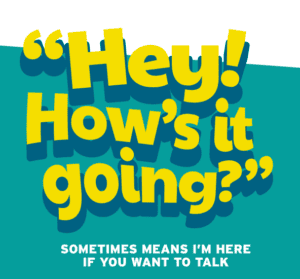1st February 2024.

Time to Talk Day. What is it? I had never heard of it until recently. Turns out, it is held every year and is run by Mind and Rethink Mental Illness and is in partnership with the Co-Op. This year it is being observed on the 1st February in the UK.
Time to Talk Day aims to encourage everyone to be more open and talk about mental health. The words ‘mental health’ still carry so much stigma. A bit like the words domestic abuse, and I have been thinking how the two can be linked in a positive way.
Talking about mental health can sometimes feel awkward and uncomfortable. Especially if we are the one’s that are experiencing mental health issues – and plenty of us are! But it doesn’t have to feel awkward of uncomfortable. A simple text or whatsapp to a friend or colleague we haven’t heard from in a while. Simply saying “Hey, how are you? It has been a while”.
Domestic Abuse and Mental Health go hand in hand. If you are experiencing or ever have experienced domestic abuse, then you will have experienced poor mental health to some degree or another. It goes without saying doesn’t it? I would be extremely surprised to speak to even one person who had experienced domestic abuse in one of its forms, who said they hadn’t experienced some form of poor mental health. In fact, I wouldn’t believe them!
In my Mum’s generation, they called it depression. I once said to my mother I felt she had poor mental health and she bit my head of and accused me of saying she was mad! Yet, the stigma continues!
No matter how hard we find it, we all have to concede, it is ‘good to talk’. That old cliché! But it is not just about talking. It is about so much more than that. It is about listening. It is about believing what someone is talking to you about. Talking, listening, believing are all things that can change a person’s life for the better.
What about disclosure? It is the same thing, isn’t it? Many people who have experienced domestic abuse fear disclosing it to another person because they are afraid of not being listened to, of not being believed. They are told by their abuser; they will not be believed. They are threatened by their abuser that if they TALK to someone they will be seen as mad. They will lose the children. They won’t be listened to or believed. So how can we all start to break down the stigma around mental health and domestic abuse?
Shall we all try to talk to one person on the 1st February. It can be about anything. It doesn’t have to be about domestic abuse. We can text or whatsapp that friend we haven’t heard from in a while. We can just simply say “How are you?” Hopefully, they will be thrilled to get a message from you and they will message you back or call you and say they are fine and ask you if you are ok. But, if they message you or call you and say they need to talk, let’s talk to them. Let’s make a promise to ourselves that we will try to help one person on the 1st February by talking. And if that talking means there is a disclosure of domestic abuse, make sure you are armed with the information you need to be able to support and signpost that person to the help they need.
- Talk
- Listen
- Believe
Three simple things we can all do to help others and ourselves.
Will you do it?


